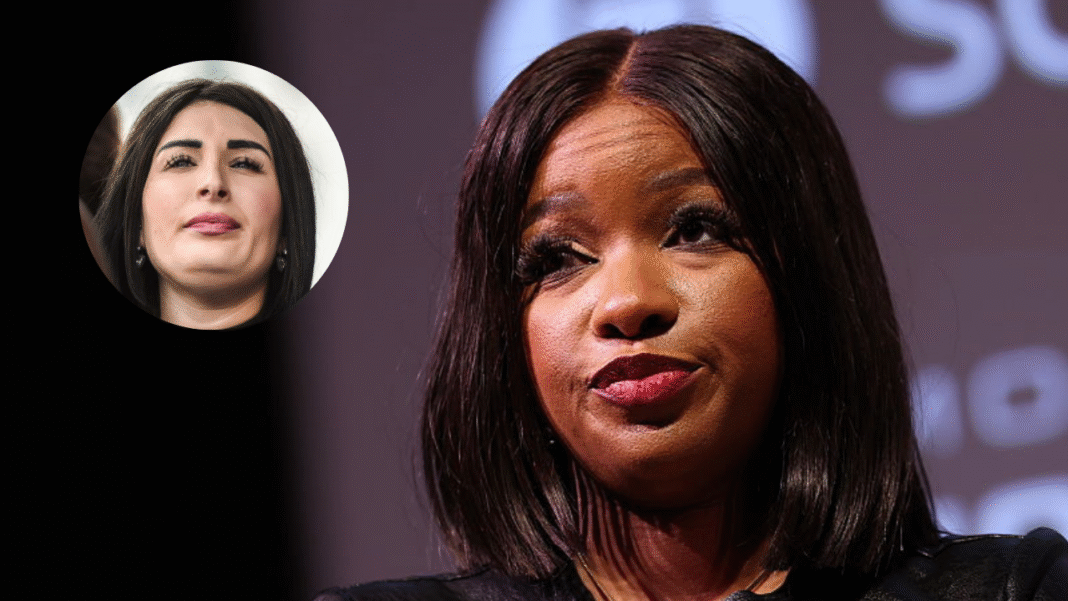The Congressional Black Caucus Stands Strong Against Racism
In a bold and determined response, the Congressional Black Caucus (CBC) has pledged to combat the recent racist attacks aimed at its member, Rep. Jasmine Crockett, a rising star from Texas. The inciting incident came when Laura Loomer, a controversial conservative figure and ally of former President Donald Trump, branded Crockett as “ghetto” during an apparent tirade.
Context of the Attack
Crockett’s remarks that drew Loomer’s ire were aimed at white Democrats who voted in favor of honoring Charlie Kirk, a known critic of Black Americans and diversity initiatives. Kirk has gone on record stating that significant legislative achievements such as the Civil Rights Act of 1964 were mistakes. In this politically charged environment, Loomer’s comments reflect not just a personal attack, but a broader ideological battle over representation and equality.
CBC Chairwoman Responds
At a recent press conference held by the CBC during the 54th Annual Legislative Conference, Chairwoman Yvette D. Clarke expressed her distress over Loomer’s remarks, stating she had to “calm down” her anger in response to such blatant racism. “These folks have lost it, and it’s coming at our expense,” she asserted, reinforcing the CBC’s commitment to stand united against such slurs. Clarke, representing New York’s 9th Congressional District, emphasized that the current political atmosphere has become dangerously hostile.
The Broader Implications
Recognizing the gravity of the situation, Clarke pointed to a broader trend cultivated by the current administration, which she argues has paved the way for what amounts to “open season on Black people.” This assertion highlights a crucial moment in American politics where racial tensions are exacerbated by inflammatory rhetoric and divisive policies. The targeting of Crockett, a Black congresswoman speaking out against racial discrimination, underscores the stakes involved.
Racism in Political Discourse
With Loomer’s derogatory comments, Clarke noted that women of color in positions of power are often subjected to unique forms of attack that blend racism and misogyny. The timing of these incidents, particularly amidst an increase in political violence, raises pressing concerns. Clarke lamented that while some politicians call for a reduction in inflammatory rhetoric, incidents like Loomer’s demonstrate a troubling contradiction.
Moving Forward
Despite the onslaught of racism, Clarke reiterated the CBC’s commitment to push back against these attacks and labeled them as “unfounded.” The overarching mission of the CBC, described as the “conscience of Congress,” is not only to defend its members but to advocate for the advancement of policies that benefit all Black Americans.
Clarke mentioned the dual responsibility facing CBC Democrats: they must respond to these attacks while also focusing on promoting an affirmative agenda. “A lot of what our colleagues are doing is so that they can get clips, they can get likes, they can get money from the election,” she reflected, suggesting a need to remain focused on substantive issues rather than getting ensnared in sensational controversies.
Outreach to the Community
The CBC’s resolve extends beyond partisan politics; it’s about uplifting marginalized voices and combating systemic issues. The caucus aims to harness the strength of community organizing to ensure that their legislative agenda aligns with the needs and aspirations of the constituencies they represent.
As the CBC prepares to confront the challenges ahead, it stands as a critical defender against racist actions and rhetoric in American politics, striving for a future where equality and justice are not just aspirations but real achievements for all.



